|
Things we have written (click "up" for the "story version"
of Mindyburg Park, or click here for our article index)
|
|
Links:
 
|
|
(▲ "Up" takes you to a slightly different
version; THIS page was
especially created to share this story with English-learners.) |

|
Mindyburg Paradise Park
A parable--Discussion version (with
vocabulary defined for English learners)
©Michael Krigline, MA (July 2007)
www.krigline.com
Vocabulary terms for English-learners are
underlined--see the definitions at the end.
There is a slightly different version, without
vocabulary and with fewer discussion questions, at
Mindyburg Park.
|
Mr. Ian Goode was a wealthy young man who owned a valuable tract of
land near the center of Mindyburg. He lived in a different place,
so he decided to dedicate this property to the enjoyment of
Mindyburg’s residents. Mr. Goode hired a team to create and construct a
beautiful park on about a third of the land, around a refreshing spring.
Citizens could drink the cool water, and children could play in a
water-playground he also constructed. There were many shady trees, a large
green lawn, benches, swings, a playground, a big sandbox, and
everything else you could hope for in a small park. He left the rest of
the property undeveloped, and hoped that his example would
encourage those who enjoyed the park to pay for future improvements.
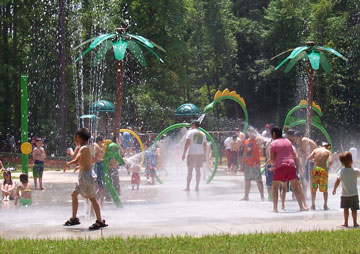
1.
Describe one of these (in English) to your partner: a water-playground,
shady trees, a large green lawn, swings, a playground, a big sandbox.
Mr. Goode also hired a
local law firm to draw up some basic rules for the property. First,
any buildings on the property must be used for the good of the people.
Second, the property must remain mostly “green space,” not primarily
buildings. Third, there could be no selling or fees in the park.
Everything could be enjoyed by rich and poor alike, as long as they were
wearing a button that said “Have a Goode Day!” (always available
for free from the law firm). Fourth, no one had to inform Mr. Goode about
future changes and thus he expected the local citizens and businesses to
voluntarily provide for the park’s upkeep, but if his financial
help was ever truly needed his lawyers just needed to inform him in
writing. Fifth, while he was giving the park to the people without
expecting a financial return, he retained the rights to the
property, including the indisputable right to enforce these basic rules.
The rules were posted in several places within the park, and also
in a mini-garden outside the park’s only entrance. Written copies were
also available from the law firm upon request.
2.
Are these rules good or bad? If you were Mr. Goode, how would you change
them? Would you add any rules?
The townspeople were thrilled about this man’s generosity, and they
loved their new park. At the entrance, they put up a big sign that said
“Mindyburg Paradise Park; Have a Goode Day!” The staff of the law firm sat
at the entrance booth, giving out “Have a Goode Day” buttons to
anyone who wanted to enter the park. The people of Mindyburg faithfully
wore their “Goode Day” buttons whenever they visited the park—mainly to
show their deep gratitude, because no one guarded the entrance or
enforced this rule. The people also declared the 15th of each
month to be “Goode Appreciation Day.” On the 15th, people
within blocks of the park decorated their homes and businesses with
flowers, and everyone exchanged the greeting: “Have a Goode day!” On the
anniversary of the park’s grand opening, they also held a
parade, and (for many years) unveiled something new at the
park. The first year, it was a free parking lot. The second year, they
added a picnic shelter near the spring and started to give out free cups
of the refreshing water.
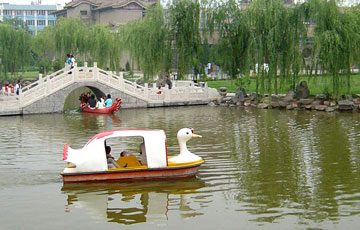
For about a decade, things went very well, but a few people began
to complain about one thing or another. The benches needed paint, a
pool near the spring kept getting dirty, there wasn’t enough parking, etc.
City Council asked Mr. Goode’s law firm for permission to form a committee
to oversee the park’s ongoing needs, and they didn’t see any reason to
prevent this.
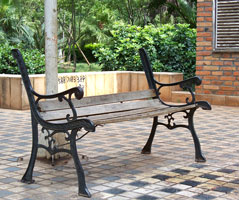 The Park Committee first decided that it would ask local businesses to
help pay for financial needs. Up to that point, different companies and
citizens’ groups would occasionally provide free cups for the water, paint
for the benches, and various other needs, but there was no consistent
oversight. Sometimes cups would run out, the grass got too long, and so
forth. Mr. Goode had expected his law firm to care for these needs, but
they had gotten busy with other things over the years. The Park Committee first decided that it would ask local businesses to
help pay for financial needs. Up to that point, different companies and
citizens’ groups would occasionally provide free cups for the water, paint
for the benches, and various other needs, but there was no consistent
oversight. Sometimes cups would run out, the grass got too long, and so
forth. Mr. Goode had expected his law firm to care for these needs, but
they had gotten busy with other things over the years.
In
fact, the firm was somewhat relieved when City Council decided to help
with the park, because maintaining the park sometimes required a lot of
time and money. They knew that “with authority comes responsibility,” but
other legal work often meant uncut grass, broken swings, and so
forth. The entrance booth had disappeared long ago, so only a few elderly
people wore “Goode Day” buttons anymore. On occasion, one of the lawyers
would suggest that they should contact Mr. Goode for additional help, but
the other lawyers always said that the current need wasn’t really big
enough to bother Mr. Goode, and eventually, they simply forgot that
he had promised to help if asked.
3.
Give reasons for your answers to these questions: Was this new Park
Committee a good or bad change? Was the law firm doing the right thing?
Why didn’t they just close the park?
Led by the new Park Committee, many people worked together to fix up the
park, because everyone agreed that the park was important to the community
and that it needed a bit of work. After the Committee reminded
local businesses that the park had begun with a generous gift to the
people, many were very happy to donate to the park’s upkeep. When
the park’s next anniversary came around, there was a second “grade
opening.” Once again there was a parade (they had stopped a few years
earlier), and lots of people flocked in to see the new benches,
enjoy the spring water, and buy ice cream at a new ice cream shop. The
Park Committee even printed and gave out free buttons that said, “Have a
good day at Paradise Park!” One of the lawyers noticed that the ice cream
was not free—it was the first time people had to pay for anything on Mr.
Goode’s land; another lawyer expressed regrets that the Park
Committee had decided to change the wording from “Have a Goode Day” to
“good day,” but the firm was too busy with other things to make any formal
protest or take any legal action.
(continued in the
next column)
|
(continued from the left column)
Things went smoothly for a few more years, but soon local businesses began
to feel that they should get a return for their donations. When one
started to sell cups of water, no one complained because they were very
cheap, and—after all—someone had to pay for the cups, didn’t they?
Another company saw how much money the ice cream shop was making, so they
started selling burgers and lemonade. Another company built a fairly large
gym (and a concrete parking garage), and those who wished to use the
facilities paid a small fee. Again, no one complained, because it only
affected a small number of Mindyburg’s citizens, and they felt that they
were getting a lot for their money.

As the years went by, the park slowly changed. Other businesses opened on
the property, sometimes creating whole new entrances to the park right by
their establishments. At first they were restaurants and
convenience stores, but after an expensive jewelry store opened it’s doors
few people cared whether the buildings were being used “for the good of
the people.” Eventually, you could even buy fake watches and
illegal drugs at certain parts of the park.
After the park’s original sign fell down, the Park Committee replaced it;
but several townspeople had complained for so long about the misspelling
of “good” (and the Park Committee got tired of trying to explain) that the
new sign simply said “Have a good day at Mindyburg Paradise Park.” By now,
neither the water-playground nor the spring water were free, the overgrown
sandbox was primarily used by pet owners as a big litter box, the
signs that told park rules were now covered with ivy, and buildings had
crowded out a lot of the once-green space. The only people still wearing
“Goode Day” buttons were a small group of fanatics who called
themselves the Mindyburg Park Restoration Society. They occasionally held
signs at the park entrances protesting about the changes and
telling people that they couldn’t get in without the required buttons.
Almost no one listened, and occasionally these nuts were even
arrested for “disturbing the peace.”
4. Who do you think was
most at fault for the park’s demise, and why? Talk about the role
each of the following had in this situation: the townspeople, Mr. Goode,
the law firm, the Park Committee, people who conducted business on the
property, the Restoration Society.
Nonetheless, the public park was still there, being enjoyed by many
people. It was now run completely by the Park Committee, mainly using
revenue from the water-playground, a swimming pool, rented building space
and concessions, for the town’s businesses had long since stopped
making voluntary donations. On paper, the law firm was the park’s legal
guardian, but after losing a series of legal cases the firm had been
reduced to little more than a few underpaid and overworked interns,
who certainly didn’t have time to oversee a public park.
To make a long story short, this once-loved public place of happiness had
greatly demised. Most sadly of all, almost no one remembered that
it had all begun with Mr. Goode’s extreme act of generosity. In fact, most
citizens had never heard of Mr. Goode, and some even said that such a
person never existed in the first place. The park’s true owner, his
rules, and his generosity had become irrelevant. On the 15th
of each month, most of the businesses on the property still followed the
habit of putting out fresh flowers, but very few knew why.
One day, the members of the Mindyburg Park Restoration Society sent a
letter to the editor of the Mindyburg News, asking that it be
printed as a public service announcement (PSA). The letter said:
Dear fellow Mindyburg citizens:
Many years ago, a
generous man created beautiful Mindyburg Paradise Park, and established a
few simple rules to keep it clean, safe, and available for all of us to
enjoy. For example, only those wearing “Have a Goode Day” buttons are
supposed to enter, and no one should have to pay for anything on the
property. But now, strangers and even drug dealers wander through the
park, where all sorts of things—good and bad—are for sale. The property
was also supposed to be mainly green space, full of life.
Today, ugly buildings, workshops, offices, and stores of all kinds
clutter the land and choke the beautiful flowers and pools that
everyone used to enjoy. Wouldn’t we be ashamed if Mr. Goode came back to
visit? And isn’t it time that we worked together to make this park the
beautiful place it was meant to be?
The editor read it,
and simply threw it away.
But the Society also sent Mr. Goode’s law firm a copy, which happened to
be read by a young lawyer who was sorting the mail. Out of curiosity,
this lawyer looked back at the original legal documents related to the
public space near the center of town. He was shocked by what he read,
especially when he learned that his law firm was legally responsible for
carrying out Mr. Goode’s instructions regarding Mindyburg Paradise
Park. After the firm discussed the situation, they decided to put their
authority to work. Starting early the next morning, their “free button”
booth was back in operation. They also hired a company to tear down
an ugly shop that sold illegal and “girly” videos, and they sent a copy of
the demolition order to the Park Committee along with a copy of the
original legal documents for Paradise Park.
The Park Committee was furious about the law firm’s actions,
organized citizens to block the demolition company, and made sure the
press was on hand for the event. People held signs that said: “Today
the video store, tomorrow the ice cream shop?” and “We don’t need your
stupid buttons!” Many miles away, Mr. Goode saw all of this on the TV
news. He was now quite old, but it just so happened that his son had been
surveying his father’s parks around the country. Some of these
parks had flourished and led to similar “gifts” in other towns, but
most had (eventually) gone the way of Mindyburg’s park. Both father and
son were deeply offended by the ingratitude of Mindyburg’s citizens, and
decided that the time had come to do something about it.
5.
What do you think they should do? What would you do if you were Mr.
Goode, and you heard about the protests?
|
|
Part B
Things to
think about
Instead of asking what went wrong, we might begin by wondering why Mr.
Goode had been generous in the first place. He didn’t have to be. This is
a great mystery of life. Why are some people good?
Selfishness is
natural—survival of the fittest, and all that. But generosity, kindness
and love run contrary to “nature.” Mindyburg’s businesses acted
“normal,” looking for ways to make a profit from the generosity (and
needs/wants) of others. Mindyburg’s citizens acted “normal,” quickly
redefining the privilege to use this park as a right
to use it in any way they wished. But it is hard to explain why someone
would just give away something worth a huge amount of money.
6.
(a) Why do you think some people are “good”? (b) Tell your partner about a
generous person you know or have read about. (c) Why do you think Mr.
Goode had donated his land in several cities to be used for public parks?
Most people can’t explain generosity in a logical way. If it is “good”
behavior, then why isn’t it more common? Other people say the spirit of
generosity is “God’s fingerprint,” because they think something
deep within our nature tells us to be like One who is described as loving
and unexplainably generous.
Whatever the explanation, it is too bad that most people live according to
what is normal for our race instead of according to the pattern
hidden deep within our nature.
Let’s go back to our discussion about who was at fault for the park’s
demise.
Some people complain that Mr. Goode was being unreasonable. They say he
had too much faith in the goodness of the people and the power of
generosity. They also complain that once Mr. Goode created the park and
made it available to the public, he no longer had the right to control his
gift, who enjoyed it, and how it was used. Perhaps he was being
overly optimistic, but the second complaint is groundless
because the original legal documents clearly stated that Mr. Goode
retained legal rights over the property. His rights did not change because
of what people “believed” about his rights (or even his existence).
7.
Doesn’t the owner have the right to make rules, and enforce them (or
generously overlook them) in the way he chooses? Another important
question is: How long can or should he put up with disobedience and
abuse? (Think back to your answer to question 5.)
Other people who hear this story blame the citizens for the park’s demise.
Mr. Goode hoped that those who enjoyed the park would honor and enforce
the rules and help the park develop, but the people lazily chose to simply
enjoy whatever was available without “paying it back.”
8.
(a) Many people think they are “too poor” to help others. Do you agree
(why or why not)? (b) Who do you think should be responsible for the
upkeep of your city’s parks: the government, local businesses, the rich
people, the people who use the parks, or someone else? Explain your
answer.
The citizens forgot that no one forced them to enter the park.
Happiness (enjoying the park) was the result of a choice to accept
a gift (accepting the invitation to enter). Choosing not to
enter had its own results (e.g., foregoing the fun inside the
park), but once people made the choice to enter, they had the
responsibility to obey the one who made the rules.
9. Discuss this quote
from President Abraham Lincoln: “Most people are about as happy as they
make up their minds to be.” In what ways do “happiness” and
“responsibilities” go hand-in-hand? Why do many people think they don’t
have to obey others’ rules and laws?
Epilogue
Mr. Goode’s
grandfather had been an immigrant, arriving in this country with
only a few dollars in his pocket. Many people—some of them as poor as
himself—had helped him get started. He began by collecting garbage,
eventually bought a collection truck, then another, and so forth until he
could bid for garbage collection contracts in neighboring
communities. With each contract, he also invested in land near the center
of these small towns, which of course eventually became cities. He never
forgot his humble beginnings nor the common people who helped him, and he
passed this appreciation down to his children and grandchildren.
In response to news
of the protests at Mindyburg Paradise Park, Mr. Goode got a court order
giving his son permission to brick up all the entrances, and (one
week after giving the tenants a warning in writing) he
arrived with many construction workers and policemen to carry out
the court order. Most businesses thought his warning was a joke, so they
were shocked one morning to a new wall blocking the way into their
businesses. From inside the walls, Mr. Goode Jr. tore down anything that
didn’t conform to his father’s original rules.
Interestingly, a few
businesses asked for permission to remain, agreeing not to charge for
their services. The ice cream shop, for example, had now built
prosperous stores in several parts of town, so they agreed to stay in
the park, offering small free ice-cream cones (one-per-person-per-day) to
park visitors—this was indeed a popular spot in the park! The gym moved
out, as did most of the other businesses, and within a week ugly walls
were being replaced with living trees, flowers and bushes.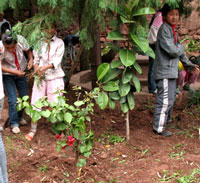
However, the protests
continued, so Mr. Goode quietly put all of his garbage workers “on
strike”—they were actually being paid to work inside the park to plant,
prune, fix, and clean the place. He also allowed members of the
Restoration Society and other volunteers to help in the clean-up effort.
Three weeks later, you wouldn’t believe how beautiful the park had become
again. You also wouldn’t believe how much filth can pile up on a
city’s streets within three weeks! Perhaps it was the huge contrast
between the piles of garbage and the growing beauty of Paradise Park, but
soon the protests stopped. Many people need a good look at their own
“ugliness” before they can appreciate something with true beauty. In the
end, there was nothing anyone could do to stop Mr. Goode or to change his
rules; the law was on his side.
Many people never
visited the park again. There were, after all, other parks in town, some
with stricter rules and some with no rules at all. There were also lots of
reasons given for avoiding Mindyburg Paradise Park:
“It’s got dumb rules, so I’d rather go
elsewhere.”
“I’m not putting ‘button holes’ in this
expensive dress!”
“My friends don’t go, and it probably isn’t
as beautiful as others say—why bother?”
“Mr. Goode is a tyrant! I can’t
believe anyone would keep people out because they aren’t wearing a free
button! I won’t support someone who acts like this.”
“I’m too busy; maybe I’ll try it someday
when I’m old.”
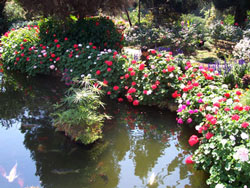 But
lots of people, faithfully wearing their “Have a Goode Day” buttons,
flocked through the renovated (and now guarded) gate to enjoy the
park’s renewed peace and beauty. And everyone who actually visited all of
the town’s parks said that none could really compare to Mindyburg Paradise
Park. But
lots of people, faithfully wearing their “Have a Goode Day” buttons,
flocked through the renovated (and now guarded) gate to enjoy the
park’s renewed peace and beauty. And everyone who actually visited all of
the town’s parks said that none could really compare to Mindyburg Paradise
Park.
10. (a) Now that the park’s
rules were being enforced, would you visit the park or go elsewhere? Would
you wear the “Goode Day” button proudly and with appreciation, or
reluctantly and only because it was required? Explain. (b) Should earth’s
kingdoms and countries have rules about who gets to be in their territory?
Should there be similar rules for who gets to be in “heaven” or the
“kingdom of God”? Who gets to make these rules? Explain. (c) If you
arrived at the park entrance, and guards asked: “Why should you be allowed
to enter Mr. Goode’s park?” What would you say? If your visit is as
wonderful as people say it will be, what would you be thinking as you
leave?
Final thoughts
and comments
The happiest people
in this tale were those who appreciated this generous gift (even
when the park was in demise), chose to enjoy it, shared it
with others, and worked to make it better for themselves and
others. Mr. Goode realized that the gifts we receive should compel
us to give away just as much, and that giving (even more
than receiving) makes us happy deep inside. By asking people to
“give” he was really inviting them to become happier! Perhaps Mr. Goode
was not unreasonably confident in the power of generosity after all.

|
|
Mindyburg
Paradise Park Vocabulary
(in alphabetical order; * means these
words are particularly important for English-learners; synonyms are shown
in bold type):
*arrested: to be picked up by the police for doing something wrong (i.e.,
a crime); if a court or judge agrees, the “arrested” person is “convicted”
of the crime and then punished
bench: a type of seat big enough for two or three people, often made of
wood and able to stay outdoors permanently
to
bid for: to make an financial offer for the right to buy or do sth (like
buying something on ebay, or “winning” the right to operate a city’s buses
or garbage service)
booth: a small, partially open place where you can do or buy something
(often outdoors or in a large public area; e.g., a phone booth or
newspaper-selling booth)
to
brick up: to completely close a window or door opening (usually with
bricks)
-burg: a word-ending that tells us that a formal noun refers to a city
(other similar “endings” are -ville and -ton)
button: (AmE) a small item (often round) that people wear on a shirt or
jacket to show their support for something (“I gave blood!”), indicate
membership (“Conference delegate”), or advertise something (“Drink more
milk!”) [also called a badge in AmE and BrE]
*to
carry out: to do (or perform) what was ordered (“The army will be carrying
out its orders to help earthquake victims.”)
to
choke (plants): to take away light and room to grow, thus killing the
plants (like a rope around one’s neck “chokes” a person to death)
*to
clutter: [vt] to fill a space in an untidy, messy or unwanted way ("Now,
many apartments clutter the land that used to be used for farming.")
*to complain/complaints: to criticize something, or openly say that you
are unhappy about it (“Don’t just complain, fix it!”); “complaints” are
statements that tell what you are unhappy about
concessions (in a park): (AmE) a business that has been given the right to
operate in a place owned by someone else (like souvenit-sellers at a
football stadium, or a restaurant in a National Park)
a
court order: a legal demand from a judge or court, telling someone what to
do or not do
*curiosity: being eager to learn something that looks interesting or
relevant
*decade=ten years
*to
dedicate (sth to a purpose): to give (a place, time, money, etc., for a
particular purpose)
the
demise of/to demise: the end of, esp. of something that was once
important; to demise is to become less and less important or
relevant
demolition: [u & adj] total destruction of a structure (sometimes also
used figuratively for other things, like the intentional destruction of an
old car or weak company)
*to donate/donations: to give something of value (time, money) for a good
reason (e.g., to help others); “donations” refers to what is given
epilogue: (AmE) something added to the end of a story to explain or give
details about the ending
*establishments=businesses or shops
*fake: [c & adj] not real but looking real, esp. used to describe
inexpensive copies of things
fanatics/nuts: a negative term to describe people who are wildly connected
with or devoted to something, esp a sports team
*filth: a very negative term that refers to dirt, garbage, human waste,
offensive sexual content or language, etc.
(his) fingerprint: (figure of speech) a unique mark or characteristic that
links something to the one who made, invented, or did something (“This
software has Bill Gates’ fingerprints all over it.”)
to
flock in: to enter in large numbers, like a flock of birds
*to flourish: to grow or develop in a healthy way (“Cooperation and
generosity made his company flourish.”)
*to
forego [or forgo]/foregoing: [vt] to omit or do without something,
especially by choice in order to get something more important
*furious=extremely angry
*garbage=trash, rubbish
*generosity: a giving spirit; a kind willingness to give (esp. money or
other valuable things)
grand opening: the time that a store or public place is first open to the
public, often celebrated with sales, speeches, and/or other special
attractions
*gratitude: a feeling of or desire to show thanks
groundless: not based on facts or reason, and thus unacceptable
*huge=extremely large
|
*immigrant: a person that leaves his home country to settle and legally
becomes a citizen of another country.
improvements (on land): structures, roads, gardens or other things that
turn undeveloped land into something people can use
*interns: people in the last step of professional training after finishing
college; a company (like a law firm or hospital) agrees to train them for
a period of time as they work in a professional environment; many interns
are paid, but less than they will earn later.
*irrelevant: [adj] not applicable; having no logical connection with sth
being discussed
law
firm: a company of lawyers and those who help them (like interns,
secretaries, and Paralegal Assistants)
*legal: related to what is “right” or “OK” according to law or the courts
a
litter box: a special “toilet” for pets, esp. cats
nuts (see fanatics)
*optimistic: tending to be positive or hopeful
parable: a story that teaches an ethical or religious point by way of
analogy (“In that parable, the seed represents Truth, and the weeds
represent distractions.”)
parade: an organized event where people march together down the street in
order to celebrate an event or holiday (in America, parades often include
marching bands of musicians, large balloons, floats—specially decorated
vehicles—sponsored by companies and clubs, clowns, men on horses, smiling
models and stars, antique cars, and much more)
posted (often passive): to officially put up a notice, announcement,
warning, etc.
*press, the press: [u] the news-gathering business in general; all people
who write and publish the news (and journalists in particular). AmE: The
press is… ; BrE: The press are…
*a privilege: something you are allowed to do because the
person/company/state who controls this property or activity says you can
[e.g., like visit someone’s home or store]
prosperous: profitable; financially successful
*to
protest/protesting/a protest: to strongly object to something, and to
complain about it in public; “a protest” [c & adj] is an organized
public meeting or action that shows the protestors’ complaints
PSA-Public
Service Announcement: (AmE) an free advertisement or notice about
something that will directly help the general public (like ads that
promote “picking up trash” or an announcement about a charity-sponsored
activity)
*to
put up with=to endure; to patiently tolerate something that is not
acceptable
*regrets: feelings of sadness because of sth that you wish had happened
differently; to “express regrets” means to “formally say that you are not
happy about what sb did”
to
renovate: to make useful again; to fix a room, building or other structure
in a “like-new,” useful way
*a return (financial return): [U&C] the amount of profit that you get from
something
*a
right: something that you are legally allowed to do, whether others (and
especially legal authorities) agree or not [e.g., worship in any way you
choose, with your family in your own home; some people say there are few
or no internationally accepted rights, so most so-called rights
are really a privilege granted by your government, boss, etc.]
to
run contrary to: to move opposite to, esp opposite to what is right or
natural
*a spring (of water): a natural source, producing clean water from deep
underground
*to survey (the parks): to ask questions or seek information in order to
discover general opinions or the truth about a current situation, or to
use equipment to "find the truth" about a piece of land (size, location,
rivers, hills, etc). ("Mr. Lee had surveyed the property carefully, to
discover its current condition.")
to
tear down: to demolish or destroy (a building, idea, etc.) (“He tore down
the other side’s argument with hard facts.”)
tenants: people or companies who rent property (like one home in an
apartment building, or one store in a row of shops)
tract (of land): large piece or section (of land)
tyrant: a political leader who uses power in a selfish, cruel or unfair
way
undeveloped land: property without any buildings or gardens yet, but
probably intended for that purposein the first place: used to talk about
circumstances at the start of a situation (often related to a decision
that later caused problems)
to
unveil: to show something to the public after it has been covered, often
during construction or development (“The governor unveiled a golden sign
showing the name of the new bridge.” “Nokia will unveil a new phone next
month.”)
upkeep: maintenance; expenses or effort needed to keep a park or business
operating
*in
writing: in an official, written form, not just spoken or communicated in
a casual way
|
|
Footnotes:
1.
The Christian Bible says “God is love” (1 John 4:8)
2.
I think the best answer is: “I don’t deserve to enter this place any
more than anyone else, but Mr. Goode has provided it, and has provided
this button to allow me to enter, so here I am.” As you leave, you
should be thinking: “What a great place! I’m so grateful for this
generous gift that I should tell my friends about it, and get them to
wear buttons so they can enjoy it too!”

Note to teachers:
Give the vocabulary
and "part A" (above "part B") one week in advance. Then the next week,
read/repeat highlighted vocabulary (without explanation), read the first
paragraph s/s (student by student, sentence by sentence, with the teacher
taking every other sentence); use a slide to summarize the rules; another
slide to summarize the first paragraph of after #2; another for the first
paragraph after #3. Break after #4. The teacher reads the “letter to the
editor”, and most of the epilogue (to save time). It is hard to squeeze
this into two class hours if students are giving good answers to the
discussion questions (like mine always do!). If you can trust your
students to pre-read up to #4, then you could save a lot of time (but I've
found that up to half do not read assigned material before class). At the end
of the exercise, refer them to the "original version" at www.krigline.com/mindyburg.htm.
The
original version of this story is a little longer, and
has one more
paragraph related to the story. You can find it at
www.krigline.com/mindyburg.htm)
Click here
regarding the sources of definitions
used on this website.
© 2007 Michael Krigline, all
rights reserved. As far as I am concerned, people are allowed to print/copy
it for personal or classroom use.
(see Website Standards and Use Policy)
|
|
For
more information about Christianity, check out
www.ccci.org/whoisjesus/interactive-journey
|

Click in the boxes below to go to some of our most popular pages. If
you get lost, just click "Home."
See our
Policy
regarding the use of materials available at Krigline.com or
Krigline.com.cn |





 But
lots of people, faithfully wearing their “Have a Goode Day” buttons,
flocked through the renovated (and now guarded) gate to enjoy the
park’s renewed peace and beauty. And everyone who actually visited all of
the town’s parks said that none could really compare to Mindyburg Paradise
Park.
But
lots of people, faithfully wearing their “Have a Goode Day” buttons,
flocked through the renovated (and now guarded) gate to enjoy the
park’s renewed peace and beauty. And everyone who actually visited all of
the town’s parks said that none could really compare to Mindyburg Paradise
Park.